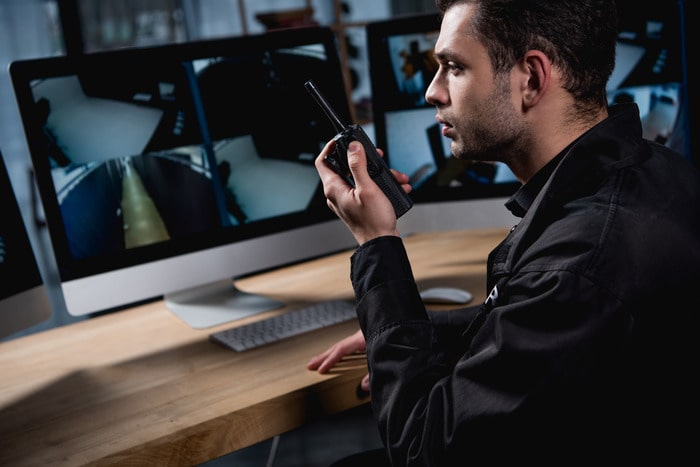
- September 16, 2023
- |security guard company
- | 0
Balancing Security and Legal Boundaries –
In the world of private security, ensuring the safety and security of individuals and property is a primary concern. Security guards play a pivotal role in this endeavor, often facing situations where they must respond to security breaches or incidents.
One common question that arises in these scenarios is whether security guards have the authority to detain individuals until law enforcement arrives. This question delves into the complex intersection of security responsibilities and legal boundaries. In this article, we will explore the topic of security guards detaining individuals, examining the circumstances, legal considerations, and best practices surrounding this practice.
The Role of Security Guards
Before delving into the issue of detention, it’s essential to understand the roles and responsibilities of security guards. Security guards are hired by private individuals, businesses, or organizations to protect their interests and maintain safety and order on their premises. Their primary responsibilities include:
1. Deterrence: The presence of security guards acts as a deterrent to potential criminals, reducing the likelihood of security breaches.
2. Surveillance: Security guards monitor premises through surveillance cameras, patrols, and access control to detect suspicious activities or security threats.
3. Response: When security breaches occur, security guards are trained to respond promptly, assess the situation, and take appropriate actions to mitigate risks.
4. Communication: Security guards often act as a liaison between clients, employees, visitors, and law enforcement agencies, relaying crucial information during emergencies.
5. Documentation: Security guards maintain records of incidents, including incident reports, which are valuable for investigations and legal purposes.
Detaining Individuals: When and How?
Detaining individuals is a practice employed by security guards in specific situations where they believe it is necessary to prevent further security breaches or harm. The decision to detain an individual is not taken lightly and should align with specific criteria:
1. Probable Cause: Security guards must have reasonable grounds to believe that an individual has committed or is about to commit a crime or security breach. Probable cause is a fundamental legal standard for detention.
2. Protecting Property or People: Detention should be aimed at protecting property, individuals, or public safety. It is not a means of punishment but a preventive measure.
3. Minimal Force: If physical restraint is necessary, security guards should use minimal force to detain the individual. The use of excessive force can lead to legal liabilities and repercussions.
4. Holding Until Law Enforcement Arrives: Detention is typically employed as a temporary measure to hold an individual until law enforcement arrives. Security guards are not authorized to conduct investigations or act as judges.
Legal Considerations
The authority of security guards to detain individuals varies by jurisdiction and is governed by both federal and state laws. It is crucial for security guards and their employers to be aware of the specific legal parameters in their area of operation. Here are some legal considerations:
1. Citizen’s Arrest Laws: In many jurisdictions, security guards have limited authority to make citizen’s arrests, similar to any private citizen. These laws typically require that the security guard personally witnesses a crime or a security breach.
2. Use of Force Laws: Laws regarding the use of force by security guards vary. The use of force must be reasonable, necessary, and proportional to the threat presented.
3. Immunity: Some jurisdictions provide limited immunity to security guards who act in good faith and within the bounds of their authority. However, this immunity is not universal and depends on local laws.
4. Liability: Security guards and their employers can be held liable for any actions taken that exceed their legal authority, result in injury, or violate an individual’s rights.
5. Training and Certification: Security guards are typically required to undergo training and certification in areas such as use of force, legal standards, and detainment procedures to ensure they operate within the confines of the law.
Best Practices for Security Guard Detention
To ensure that security guards detain individuals in a lawful and responsible manner, several best practices should be observed:
1. Training: Security guards should receive comprehensive training on detainment procedures, use of force, and legal standards. Regular refresher training is essential to keep their skills up to date.
2. Communication: Security guards should clearly communicate their intentions and the reasons for detention to the individual involved. Maintaining a calm and respectful demeanor is crucial.
3. Minimal Force: If physical restraint is necessary, security guards should use minimal force, only as a last resort, and in accordance with legal standards.
4. Law Enforcement Notification: Security guards should promptly notify local law enforcement when an individual is detained, providing them with the necessary information and cooperating fully with their arrival.
5. Documentation: Security guards must maintain accurate and detailed records of the incident, including the reasons for detention, actions taken, and any statements made by the detained individual.
6. Legal Consultation: In situations where the legal boundaries are unclear, security guards should seek legal counsel or guidance from their employer to ensure compliance with the law.
Security guards have a crucial role in maintaining safety and security on private premises, and in some cases, this may involve detaining individuals when necessary. However, the authority to detain is not unlimited, and security guards must operate within the boundaries of the law.
Understanding the legal considerations, receiving proper training, and adhering to best practices are essential for security guards to carry out their duties responsibly and effectively. By striking the right balance between security and legal boundaries, security guards contribute to the protection of individuals and property while upholding the principles of justice and law. Contact us to learn more.


